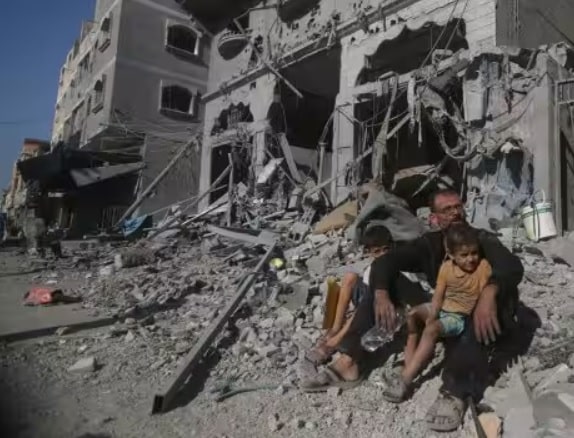What’s in today’s article?
- Why in news?
- News Summary: War crimes laws applicable to the Israel-Palestinian conflict
- Laws governing the conflict
- What is the role of the ICC?
- What acts could violate war crime law?
- Do the Geneva Convention apply?
Why in news?
- Conflict between Israel and Palestinian forces since militant group Hamas’ recent assault have created a huge and rising death toll on both sides.
- The war falls under a complex international system of justice that has emerged since World War Two.
News Summary: War crimes laws applicable to the Israel-Palestinian conflict
Laws governing the conflict
- 1949 Geneva Conventions
- Internationally accepted rules of armed conflict emerged out of the 1949 Geneva Conventions.
- These rules have been ratified by all UN member states and supplemented by rulings at international war crimes tribunals.
- International Humanitarian Law
- A series of treaties governs the treatment of civilians, soldiers and prisoners of war in a system collectively known as the Law of Armed Conflict or International Humanitarian Law.
- It applies to government forces and organised armed groups, including Hamas militants.
- The International Criminal Court (ICC) in The Hague
- If alleged Palestinian perpetrators of atrocities in Israel and all alleged perpetrators of crimes on the occupied Palestinian territories are not brought to justice at home, the ICC can charge them.
- It is the only global court that can hold them accountable.
- The ICC’s founding Rome Statute gives it legal authority to investigate alleged crimes on the territory of its members or by their nationals, when domestic authorities are “unwilling or unable” to do so.
What is the role of the ICC?
- About
- The International Criminal Court (ICC), the world’s permanent war crimes tribunals, opened in The Hague in 2002.
- It has jurisdiction over war crimes, crimes against humanity and genocide in its 123 member states or committed by its nationals.
- Members
- Many of the world’s major powers are not members, including China, the United States, Russia, India and Egypt.
- The ICC recognises Palestine as a member state, while Israel rejects the court’s jurisdiction and does not formally engage with it.
- ICC and investigation in the Palestinian territories
- With a limited budget and staff, ICC prosecutors are already investigating 17 cases ranging from Ukraine and Afghanistan to Sudan and Myanmar.
- The ICC budget has allocated just under a million euros for investigations in the Palestinian territories for 2023 and is seeking additional resources.
- The ICC has had an ongoing investigation into allegations of war crimes and crimes against humanity committed in the occupied Palestinian territories since 2021.
What acts could violate war crime law?
- Experts cited as possible war crimes:
- the deliberate targeting of civilians, indiscriminate rocket attacks, and the taking of civilians as hostages by Palestinian armed groups,
- as well as the Israeli counter-strikes in Gaza that killed hundreds of Palestinians.
- The taking of hostages, murder and torture are explicitly banned under the Geneva Conventions.
- Also, Israel’s response could also be subject to a war crimes investigation.
- Israel drew criticism from UN officials and human rights groups by announcing a tightened blockade to prevent food and fuel from reaching the Gaza Strip, home to 2.3 million people.
Do the Geneva Convention apply?
- A siege can be considered a war crime if it targets civilians, rather than a legitimate means to undermine Hamas’ military capabilities, or if found to be disproportionate.
- Attacks on military objectives have to be proportional under international law.
- This means they must not lead to excessive loss of civilian life or damage to civilian objects in relation to the direct and concrete military advantage expected.
Q1) What is 1949 Geneva Convention?
The 1949 Geneva Conventions are a set of four treaties that protect victims of war. They define the rights and protections for non-combatants who fulfill the criteria of being protected persons. The Conventions were adopted in reaction to World War II. They clarify and codify the many rules of the laws of armed conflict that had been established in earlier treaties.
Q2) What are human rights?
Human rights are rights we have simply because we exist as human beings – they are not granted by any state. These universal rights are inherent to us all, regardless of nationality, sex, national or ethnic origin, color, religion, language, or any other status.
Source: What war crimes laws apply to the Israel-Palestinian conflict?
Last updated on June, 2025
→ UPSC Notification 2025 was released on 22nd January 2025.
→ UPSC Prelims Result 2025 is out now for the CSE held on 25 May 2025.
→ UPSC Prelims Question Paper 2025 and Unofficial Prelims Answer Key 2025 are available now.
→ UPSC Calendar 2026 is released on 15th May, 2025.
→ The UPSC Vacancy 2025 were released 1129, out of which 979 were for UPSC CSE and remaining 150 are for UPSC IFoS.
→ UPSC Mains 2025 will be conducted on 22nd August 2025.
→ UPSC Prelims 2026 will be conducted on 24th May, 2026 & UPSC Mains 2026 will be conducted on 21st August 2026.
→ The UPSC Selection Process is of 3 stages-Prelims, Mains and Interview.
→ UPSC Result 2024 is released with latest UPSC Marksheet 2024. Check Now!
→ UPSC Toppers List 2024 is released now. Shakti Dubey is UPSC AIR 1 2024 Topper.
→ Also check Best IAS Coaching in Delhi
























